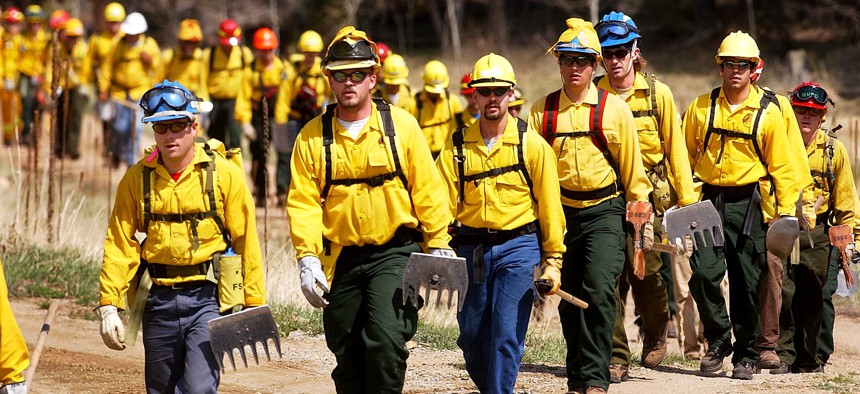
National Federation of Federal Employees Director Steve Lenkart said congressional leaders have assured him they plan to address salary funding for federal wildland firefighters, should they be able to reach a budget agreement. Helen H. Richardson / Getty Images
Odds of a fix for impending wildland firefighter ‘pay cliff’ improve, but complications remain
Union officials say they’ve received assurances from leadership in both the House and Senate that Congress will work to avert massive pay cuts that could kick in next month.
Officials at a federal employee union representing thousands of members of the federal government’s corps of wildland firefighters said they are confident that Congress will act to avert a “pay cliff” that threatens to cut wages by up to half of their salaries, provided lawmakers can reach an agreement to fund—or reopen—the government.
In June 2022, the Biden administration authorized pay raises of $20,000 per year or 50% of their base salary, whichever was lower, for federal wildland firefighters, as part of a multi-year effort to correct a sizeable pay gap between federal firefighters and their counterparts in state and local government. But because the initiative was funded through the bipartisan infrastructure law, the money to pay for the raises is set to run out beginning next month.
Earlier this month, the National Federation of Federal Employees, which represents more than 10,000 federal wildland firefighters, warned that if Congress fails to avert the looming pay cuts, anywhere between one-third and one-half of the federal government’s wildland firefighters could seek employment elsewhere within the next year, and state and local governments are already gearing up to recruit them.
On Monday, NFFE Executive Director Steve Lenkart told Government Executive that his union has received assurances from leaders of both parties in both chambers of Congress that they’re committed to maintaining federal firefighters’ pay after this month, whether that be through appropriations bills, a supplemental funding bill or an “anomaly” in a short-term continuing resolution. A permanent pay fix, the Wildland Firefighter Paycheck Protection Act, also has strong bipartisan support.
“We’ve received commitments from [Senate Majority Leader Chuck] Schumer and [Minority Leader Mitch] McConnell, as well as from [House Minority Leader Hakeem] Jeffries and [Speaker Kevin] McCarthy to include some kind of funding to keep pay at the level it’s at now for wildland firefighters,” he said. “We have great support, rich bipartisan support in both the House and Senate. Pretty much everyone is on the same page and wants to help.”
Despite the apparent zeal in preventing the potentially five-figure pay cuts, there exists major uncertainty over whether the measure will make it into law, thanks to the morass of trying to keep the government open past Sept. 30 amid an ongoing mutiny within the House Republican caucus.
“We’re still on pins and needles waiting to see what happens this week,” Lenkart said. “If it’s a CR, we want funding in the CR, and if it can be attached to a supplemental or other appropriations bill, we don’t really care, as long as there’s no interruption to the pay rates that the firefighters are getting now.”
Also briefly complicating the debate over federal firefighter pay were accusations by the GOP staff of the House Natural Resources Committee that unions and the Biden administration had exaggerated when agencies would run out money from the bipartisan infrastructure law to pay the firefighters’ their current salaries. Fox News last weekend accused the White House of advancing a purportedly “misleading narrative” on the pay cliff and feared employee exodus.
The most recent estimates from the Interior and the Agriculture departments are that Interior’s funding for the firefighter pay increases will run out in mid-October, while Agriculture will run out on Nov. 4.
“[The committee staffers] thought they were being deceived by the Biden administration, but the truth is that we’ve got a few extra weeks of time simply because it’s been a slower fire season than last year, so that money is stretching a few weeks longer,” Lenkart said. “But we’re talking at best a 15- to 30-day cushion, and in congressional time that’s basically five minutes to get something passed.”
Republican aides also reportedly have expressed an interest in reprogram money from the bipartisan infrastructure law that was set aside to compensate firefighters such as via hazard pay and to pay for mental health supports.
“At least half of that money is already committed, and under no uncertain terms do we want to take away money for mental health and wellness and reprogram that into pay,” Lenkart said. “The suicide rate for wildland firefighters is, depending on who you ask, between four and 10 times more likely than the average population.”
NEXT STORY: Best Dates to Retire 2024







